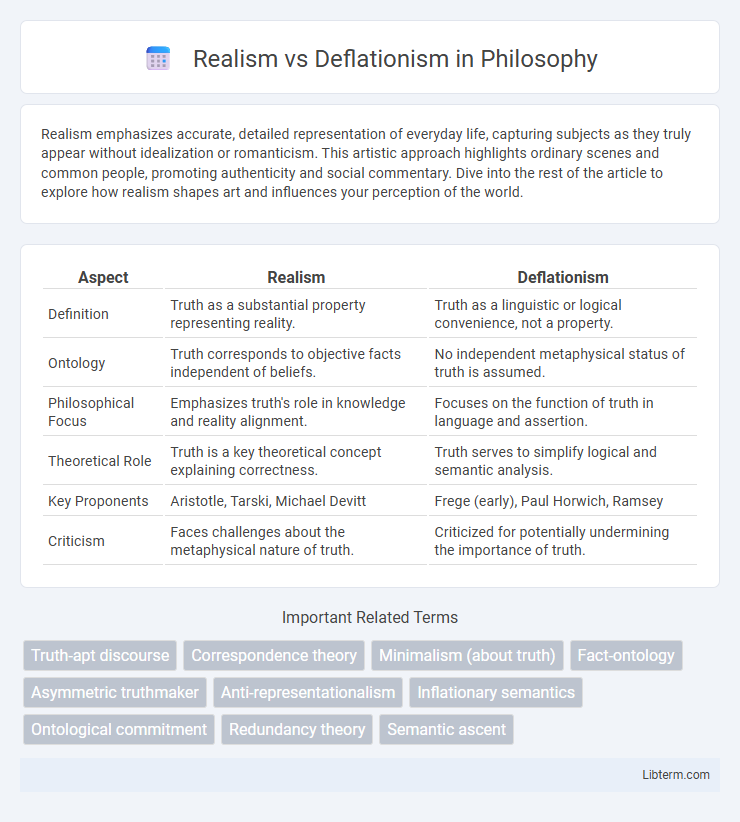Realism emphasizes accurate, detailed representation of everyday life, capturing subjects as they truly appear without idealization or romanticism. This artistic approach highlights ordinary scenes and common people, promoting authenticity and social commentary. Dive into the rest of the article to explore how realism shapes art and influences your perception of the world.
Table of Comparison
| Aspect | Realism | Deflationism |
|---|---|---|
| Definition | Truth as a substantial property representing reality. | Truth as a linguistic or logical convenience, not a property. |
| Ontology | Truth corresponds to objective facts independent of beliefs. | No independent metaphysical status of truth is assumed. |
| Philosophical Focus | Emphasizes truth's role in knowledge and reality alignment. | Focuses on the function of truth in language and assertion. |
| Theoretical Role | Truth is a key theoretical concept explaining correctness. | Truth serves to simplify logical and semantic analysis. |
| Key Proponents | Aristotle, Tarski, Michael Devitt | Frege (early), Paul Horwich, Ramsey |
| Criticism | Faces challenges about the metaphysical nature of truth. | Criticized for potentially undermining the importance of truth. |
Understanding Realism: Key Concepts
Realism posits that truth is an objective property reflecting reality independent of beliefs or linguistic frameworks, asserting the existence of mind-independent facts. The correspondence theory underpins realism, emphasizing that a statement's truth hinges on its accurate representation of the world. Key concepts include truth as a substantial, explanatory notion and the commitment to a metaphysical reality that truth reliably tracks.
Defining Deflationism: An Overview
Deflationism defines truth as a minimal concept, rejecting substantial metaphysical or epistemological properties attributed by Realism. It holds that truth merely serves a logical or linguistic function, often captured by the equivalence schema: 'The statement "P" is true if and only if P.' This perspective avoids committing to truth as a robust or explanatory property, emphasizing the pragmatic role of truth in language and thought.
Core Differences Between Realism and Deflationism
Realism asserts that truth is a substantial property reflecting objective reality independent of our beliefs, whereas deflationism treats truth as a mere linguistic convenience without deep metaphysical significance. Realism involves the correspondence theory, claiming statements are true when they accurately describe facts, while deflationism emphasizes the redundancy of the truth predicate, suggesting asserting "it is true that P" adds no content beyond affirming P itself. These core differences highlight realism's commitment to a robust truth concept versus deflationism's minimalist, pragmatic approach.
Historical Origins and Philosophical Development
Realism in philosophy emerged prominently in the Middle Ages, grounded in the belief that universals possess independent, objective existence beyond human cognition, as seen in the works of Plato and Aristotle. Deflationism arose in the 20th century, influenced by logical positivism and ordinary language philosophy, asserting that truth is merely a linguistic or pragmatic device without substantial metaphysical weight. The historical development of Realism emphasizes ontological commitments to mind-independent realities, whereas Deflationism redirects focus toward the functional role of truth in language and communication.
Major Proponents of Realism and Deflationism
Major proponents of Realism include philosophers like Hilary Putnam and Michael Dummett, who argue that truth exists independently of our beliefs and language. Deflationism, championed by scholars such as Paul Horwich and Huw Price, contends that truth is a minimal property, serving merely as a logical device without substantial metaphysical commitment. These opposing perspectives fundamentally shape ongoing debates in philosophy of language and truth theories.
Truth and Meaning: Contrasting Perspectives
Realism asserts that truth is an objective property reflecting a correspondence between statements and an independent reality, emphasizing meaning as tied to factual accuracy. Deflationism challenges this, arguing that truth lacks a substantive property and functions primarily as a logical or linguistic tool, minimizing the role of truth in conveying meaning. These contrasting perspectives highlight fundamental debates about whether truth and meaning are metaphysical constructs or simply instruments of language.
The Role of Language in Both Theories
Realism posits that language directly corresponds to an objective reality, where words and sentences represent factual states of the world independent of human perception. Deflationism, by contrast, views language as a tool for expressing logical or pragmatic utility rather than capturing metaphysical truths, emphasizing the minimal role of truth predicates in semantic theory. The debate centers on whether linguistic expressions have a truth-apt relation to an external reality (Realism) or merely function through linguistic conventions and use (Deflationism).
Criticisms and Challenges Faced by Each View
Realism faces criticisms regarding the metaphysical commitment to abstract entities and the epistemological challenge of explaining how humans can have knowledge of these non-empirical objects. Deflationism struggles with objections about its inability to fully capture the normative and substantial role of truth in language and reasoning, often accused of reducing truth to a mere linguistic convenience. Both views grapple with balancing the explanatory power and ontological economy, leading to ongoing debates on the nature and function of truth in philosophy.
Real-World Implications and Applications
Realism in philosophy asserts that truths exist independently of human beliefs, influencing fields like science where empirical data is valued for objective knowledge discovery. Deflationism challenges the profundity of truth, emphasizing the simplicity of the truth predicate, which reshapes approaches in linguistics and computer science by streamlining semantic theories. The real-world implications involve the preference for realism in developing robust, testable scientific models, while deflationism supports minimalist interpretations in artificial intelligence and language processing.
Future Directions in the Realism vs Deflationism Debate
Future directions in the realism versus deflationism debate emphasize advancing semantic theories that reconcile truth's metaphysical nature with its functional role in language. Emerging research explores hybrid models integrating minimalist truth predicates with robust ontological commitments to address criticisms from both camps. Investigations into cognitive science and formal semantics aim to refine these theories, enhancing explanatory power regarding truth's connection to belief, meaning, and linguistic communication.
Realism Infographic

 libterm.com
libterm.com